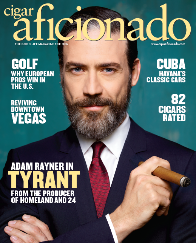The cast of Tyrant, FX’s provocative and controversial series, brings a story of power and betrayal alive in cable TV’s most exciting show. With its third season set to premiere July 6, its leading star, Adam Rayner—who plays Bassam Al-Fayeed, a man who returns to the Middle East and his aristocratic heritage after 20 years in the U.S.—sat down with Cigar Aficionado to discuss current events, real life versus the show, his character’s ethnic background, his career and being compared to Abraham Lincoln, among a variety of topics.
August cover story of Cigar Aficionado hits newsstands June 21. Here’s some:
On being a white Westerner playing a Middle Eastern character: “My main research was reading about the region…I was learning about Bedouin and Arab culture, the history and politics, as well as the current political climate, trying to gain an understanding and knowledge that Bassam would have grown up with.”
Howard Gordon, executive producer of Tyrant (as well as 24 and Homeland), on Rayner: “Obviously it’s a challenge for someone with no experience of the Middle East to play someone from there. Adam has been up to it.”
Eric Schrier, FX Networks president of original programming, on filming in a war zone: “We try to take big swings. A show set in the Middle East? That’s a big swing…Let’s say this show had its challenges, production-wise, that first season. I mean, they were shooting rockets.”
Gwyneth Horder-Payton, co-executive producer, on the challenges of shooting scenes set in a mosque: “We built the set and hired extras of Arab descent. When Barry [Rayner’s character] walked into the middle of the service, they were upset because they said this would never happen in a mosque—it would never be allowed. Plus, here I am, a woman, in the mosque. Also not allowed. And I’m wearing shoes, because I’m going back and forth outside…Also not allowed. And they were serious, even though it was a set we’d built and not a real mosque.”
On the similarities between Rayner’s character and Syria dictator Bashar al-Assad: “The parallels to Assad are obvious. The old-style dictator father, the son who’s been trained in the West. Still, it’s important to say that this isn’t a show about one country. That would prevent us from dealing with issues that are more common region-wide.”
On the dethroning of dictators like Saddam Hussein and Muammar Qaddafi: “How do you rule over a democracy when you’ve got a gun to your head? One easy way to solve the problem is to get a gun to the other guy’s head. It solves the problem—but it’s not democracy…How do you create security for the country without compromising those democratic principles? Democracy requires a lot of preparation, with elections after you’ve educated the people. But how long will that take? And who’s in charge in the meantime? It’s not as simple as, well, we got rid of Hussein or Qaddafi and now we’ll have democracy.”
On being compared to Abraham Lincoln: “When you’re playing a president or a dictator, it’s a time-honored cliché that a beard bestows authority on a man- or that’s my hope, anyway. People on the show have started calling me Abe Lincoln, which is an interesting comparison. I’m not quite sure if it’s a compliment or not.”
On the significance of cigars in Tyrant: “They’re considered quite a Western symbol, associated with the power and wealth, smoked by the Tony Sopranos of the world.”
On authoritarianism and building democracy: “Because to build the democratic process, first you have to delay the democratic process—and that’s an authoritarian government.”

